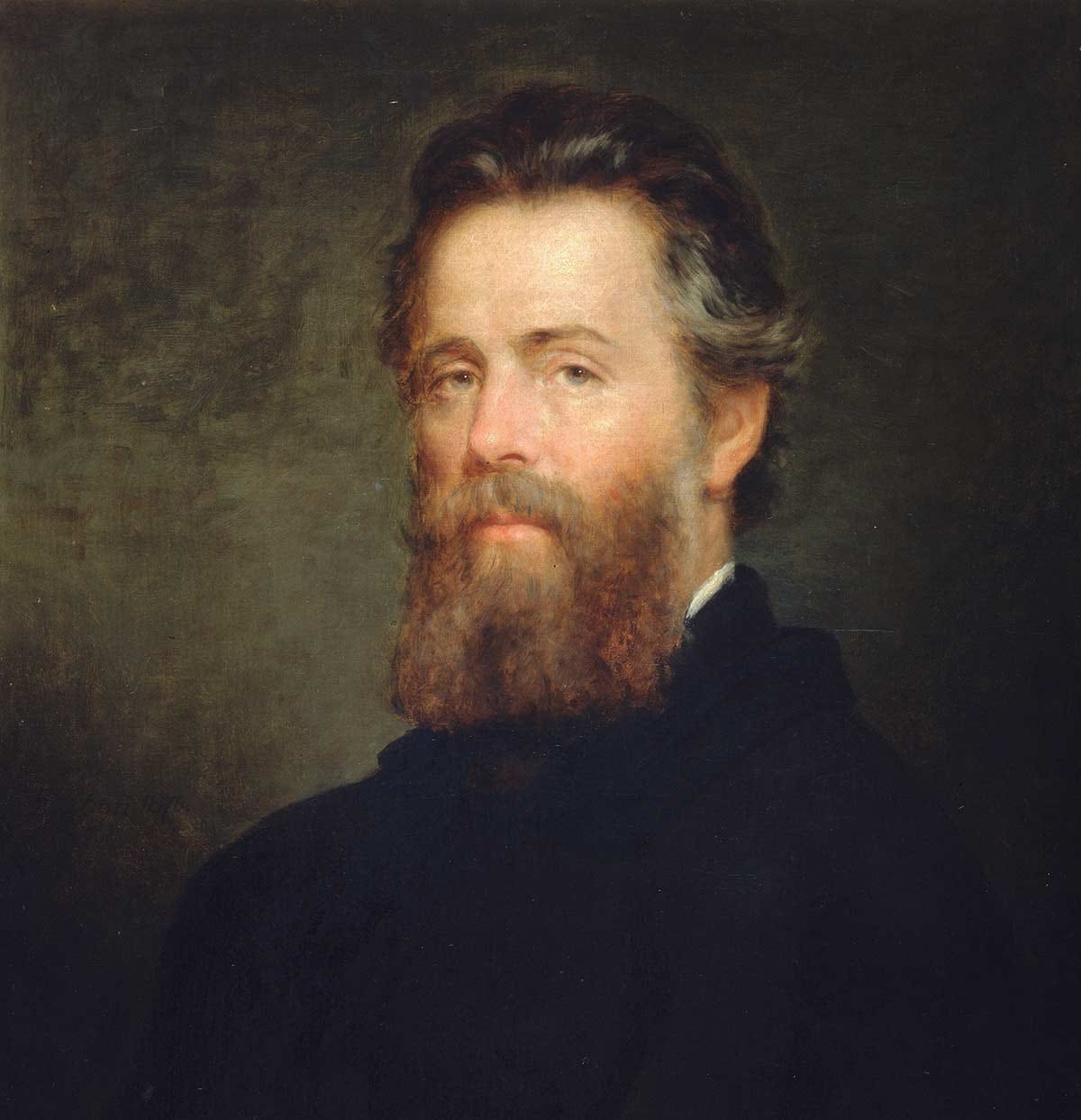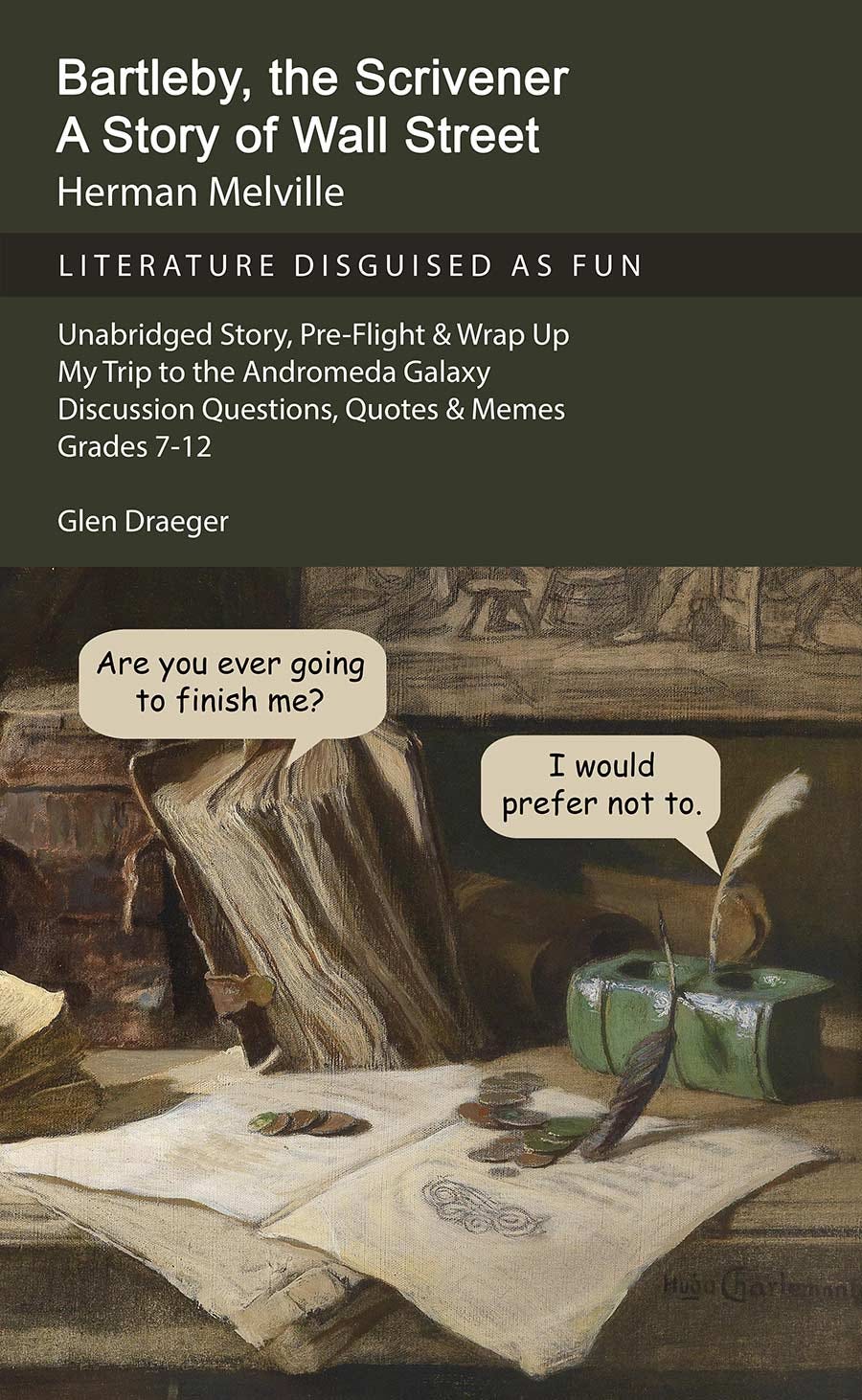Herman Melville is best known for his long masterpiece, Moby Dick, but he also wrote several shorter pieces that are considered classics: Billy Budd, “Benito Cereno” and “Bartleby, the Scrivener.”
Melville’s full title for the latter is, “Bartleby, the Scrivener: A Story of Wall Street.” On the surface it is the story of young man who “prefers” not to do things, but after reading this story your students will never forget the phrase “I would prefer not to.”
In our edition of Bartleby, part of the Literature Disguised as Fun series, there is a creative biography of Melville which is included below in full.
My Trip to the Andromeda Galaxy
Hello members of humanity,
Unfortunately I had to take H.G. into the time-machine repair shop. For those of you who don’t know H.G. stands for H.G. Wells, the English writer of science fiction and many other topics. I’ve got this wild looking man working on the H.G. who says it needs a new flux-capacitor.
Anyway, this means I can’t go back and meet Melville and tell you about it. I could go old school and take a trip to the library to check out some books on Melville, read about him in the encyclopedia and see what other information I have in my own library, but I do so much reading and research as it is that I need a break. I could even use the internet, but how fun is that? I have, luckily, another option.
You probably don’t know that I also own a spaceship. I used to have two, but I had to sell my other one to repair H.G., but this spaceship is my favorite and a top-of-line model. I call it Lem One in honor of Stanislaw Lem the great writer of science fiction novels, short stories and essays. Lem One’s optimum speed is thousands and thousands of times faster than the speed of light so I can travel to galaxies far, far away and still be back in time for dinner—not that there aren’t good places to eat in the rest of the universe. There are. Lem One is very small and fits in my closet. I’d appreciate it if you wouldn’t mention this to anyone because I don’t have a permit for it.
During my travels throughout the universe I have happened upon many strange, wonderful and scary planets. My favorite planet for research is Hieghiehhdynerf (don’t try to say these) located in the Pqmkeojkmkie solar system which is located in the Andromeda galaxy. Pqmkeojkmkie has a large sun surrounded by 273 inhabitable planets, Hieghiehhdynerf being one of them. Pqmkeojkmkie is known for its extensive libraries devoted to life throughout the rest of the universe. They study the rest of us and Hieghiehhdynerf is devoted to life in the Milky Way galaxy and one small city, Zirtezooxen, solely studies our planet, Earth.
How can they do this? Thousands of years ago they invented a small, organic, self-reproducing computer. It was such a perfect invention that it has never been changed and is the only thing that can be found on almost every planet in the known universe. It’s the common fly.
Who would suspect? No one—that’s why they use it. In this way they are able to watch and hear almost everything. Their libraries contain information on almost every person that has ever lived on the earth—they don’t just study famous people. Actually, I’ve read the files on all of you reading this—it was very interesting reading. How I know you are reading this is another story, for another time.
Anyway, have you heard the phrase “I’d like to be a fly on the wall” in reference to hearing a conversation two people might have without you? Well, that’s what’s happening and that’s one reason why there are so many flies.
Why am I telling you all this? I have a friend, Tirs Humsudonterquex in Zirtezooxen who studies authors and has agreed to talk to me. I’ve told him all about this book and he’s quite excited about sharing his knowledge with students from the planet he studies.
Tirs is not like anyone or anything you’ve ever seen. He doesn’t resemble an animal or a human or a plant or a machine. He has no head or arms or legs, but he’s not a blob, he’s, well, he’s hard to describe because he doesn’t look like any living thing I’ve ever seen, so if I say one part of his body sort of looks like a very thick hippo you’ll get the wrong idea. That’s the closest thing I can think of for part of his body, but that’s not what he looks like—he looks like—well, he looks like Tirs. He’s not ugly. He’s not large. He smells—but he’s not smelly. He’s quite a bit smaller than me—though when he gets angry he can quadruple in size in a matter of seconds. He speaks fluent English and has been around for about 739 earth years—still young by Hieghiehhdynerf standards.
What follows is the conversation we had last week about Herman Melville.
Me: Tell me about Melville.
Tirs: I became very interested in him when he took his first sea voyage. We have no oceans here, as you know, and the huge expanse of water fascinated me.
Me: Why did he take to the sea?
Tirs: He came from a family that was very involved in politics and business and they wanted him to do the same. He worked for two years as a bank clerk and for a few months on his uncle’s farm. Then he worked with his brother when he took over their father’s felt and fur business.
Me: How old was he?
Tirs: He must have been about 19 when he joined his brother. The fur business went under and Melville taught for three months but he didn’t like it. The last job he tried to get before he went to sea was as a surveyor but it didn’t work out. In 1839 at the age of 20 he took a job as a cabin boy on a the merchant ship, St. Lawrence, bound from New York to Liverpool. Strange, strange, those ships are.
Me: You sound like Yoda.
Tirs: The Star Wars’ movies are interesting—very accurate—except there are no flies.
Me: Accurate?
Tirs: Of course! Consider this: the universe is infinite, therefore there are an infinite number of possibilities, hence any possibility that you can think of has to be a reality somewhere else in the universe. Simple logic, my friend. I have a colleague who studies Yoda’s corner of the universe. Now, back to Melville.
[Note: I should mention here, and I will, that digressions like the above were common throughout our conversation, but I have eliminated the rest of them in order to keep this as short as possible. Tirs is also a great lover of food, friends and naps. Quite often during our conversation we would stop to eat or one of his friends would drop by or we would take a nap. It was an extremely leisurely conversation.]
Me: When did he go on a whaling ship?
Tirs: Hang on, hang on. After this voyage he came home and tried to get work again—finally he taught at a school that closed down without paying him. He then went on his second voyage—on the whaler “Acushnet” bound for the South Seas. Here, take at look at this.
[Note: Tirs has a—a—I don’t know what to call it. It is a huge round pool of clear liquid that has a diameter of about 20 feet and is three feet deep. It’s their equivalent of a video player. When he turns it on the liquid somehow forms itself into perfect, 3 dimensional, full-color figures that raise up above the sides of the pool. There stood Melville about 12 inches high with his long beard and calm, almost sallow eyes. It was such a perfect representation that it made me feel like I was a giant. The buildings, the roads and in this case the ship, looked absolutely real—except they were small. I watched large sections of Melville’s life on this thing countless times throughout our conversation.]
Tirs: This was the voyage when Melville and a friend of his jumped ship and lived with cannibals for four months. Our information is a little sketchy here because there are too many fly-eating insects in that particular jungle. His first novel, Typee (1846) is about his adventures there. On the same voyage he joined a mutiny and was thrown in jail. He escaped. His novel Omoo (1847) is about that. In late 1842 he was hired as a harpooner on the “Charles & Henry.” He disembarked six months later on Hawaii where he stayed for three months before sailing to Boston by way of the frigate “United States.”
His first two novels were very successful and the critics loved them. His third novel, Mardi, the critics didn’t like so much, so he wrote two more, Redburn (1849) and White Jacket (1850), which were better received by both the public and the critics—but still not to the degree of his first two.
Me: Did this bother him?
Tirs: Sure, but he wanted to write differently than he had been. He was a philosophical man and he began to struggle more and more with his place in the universe—he didn’t want to write “popular” novels anymore. He wanted people to like his work, but he wanted to write things that had more depth and that mattered to him. Here’s a portion of a famous letter he wrote to Nathaniel Hawthorne, the author of The Scarlet Letter, who was a good friend of his.
In a week or so, I go to New York, to bury myself in a third-story room, and work and slave on my ‘Whale’ while it is driving through the press. That is the only way I can finish it now—I am so pulled hither and thither by circumstances. The calm, the coolness, the silent grass-growing mood in which a man ought always to compose,—that, I fear, can seldom be mine. Dollars damn me. . . . My dear Sir, a presentiment is on me,—I shall at last be worn out and perish. . . . What I feel most moved to write, that is banned,—it will not pay. Yet, altogether, write the other way I cannot.
Me: Wow! He sounds almost tormented to me.
Tirs: There were times when his family thought he had lost it, but I think he was struggling with the big questions of existence. Hawthorne once wrote this about a visit he had with him:
Melville, as he always does, began to reason of Providence and futurity, and of everything that lies beyond human ken, and informed me that he had ‘pretty much made up his mind to be annihilated’; but still he does not seem to rest in that anticipation; and, I think, will never rest until he gets hold of a definite belief. It is strange how he persists — and has persisted ever since I knew him, and probably long before — in wondering to-and-fro over these deserts, as dismal and monotonous as the sand hills amid which we were sitting. He can neither believe, nor be comfortable in his unbelief; and he is too honest and courageous not to try to do one or the other. If he were a religious man, he would be one of the most truly religious and reverential; he has a very high and noble nature, and better worth immortality than most of us.
Tirs: The next novel he wrote was Moby Dick, published in 1851, and it is his most famous novel in your world, but at the time no one thought much of it. He was 32 when it was published and he had gone from being a literary sensation to a disappointment. Throughout the rest of his life he would never again receive the acclaim he did in his younger years. He wrote “Bartleby, The Scrivener: A Story of Wall Street” in 1853 and another novel, The Confidence-Man in 1857.
Me: He was only in his 30’s at this time?
Tirs: Yes. He quit writing novels and turned to poetry, but his output was much less. This might partly be because of two tragedies in his life. In 1867 his son Malcolm shot himself when he was 18. No one is sure if it was a suicide or an accident, although it appears to have been a suicide. His brother, Stanwix, died in San Francisco in 1886.
Me: That’s terrible. How did Melville support himself and his wife?
Tirs: He finally got a job as a customs inspector in New York. Like many struggling writers, he worked during the day and wrote in the evenings and on weekends—though by this time six novels and numerous short stories and articles of his had been published. When he finally died in 1891 at the age of 72 hardly anyone noticed. There was one obituary. His last novel, Billy Budd, was published in 1924.
Me: Now he’s considered one of America’s greatest writers. It’s remarkable.
Tirs: Not really, Glen, many of Earth’s great writers and artists are never recognized as great talents until after their deaths.
Me: I guess you’re right. Emily Dickinson and Van Gogh are just two more examples.
Tirs: The same thing happens here—it’s really no different anywhere else. That’s the first thing you realize in my position. We all look different, and your species is particularly ugly—no offense—but we’re all really the same.
Me: Very funny, Tirs. Well, on that note I thank you for your time, your food—what was that greenish—purplish—sticky—slimy?—better not tell me—and your conversation. I’m sure my readers will appreciate it.
Tirs: Maybe they could come sometime? It would be a great field trip!
Me: I’ll ask them.
Well, space travelers? What do you think? Would you prefer not to? Let me know.
A Note to Parents: Any and all field trips to the Andromeda Galaxy will require accidental death insurance.
All the books in our Literature Disguised as Fun series contain creative biographies of the authors. The books also include discussion questions, a brief analysis of the story, novel or poetry, cartoons, memes and more.








